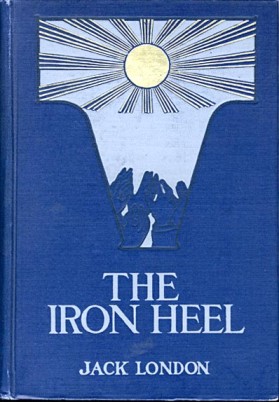In The Iron Heel, Jack London warned about an all-powerful oligarchy or plutocracy. As we have seen in the century since, the real threat issues not from capitalists or corporations but from governments, who have murdered, starved, tortured, and imprisoned countless millions for ideological reasons. But even at this late date, and with evidence in abundance, there are those among us who believe that governments are essentially good and corporations essentially evil. Many of those people fantasize about corporate dystopia in the same way that preppers and Baptists fantasize about apocalypse. I suppose that's an example of the perverse human drive to fantasize about the thing you hate or fear the most, or the equally perverse wish for the world to be destroyed. Maybe the Occupy movement and people like them, existing as they do in a state of extreme boredom, comfort, and inaction, would like to test themselves against a world of corporate threats. Maybe only then might they feel fully alive and human.
Anyway, I read awhile back about the Syfy network's plans to develop a television series called Incorporated. "Set in a future where companies have unlimited power," Incorporated will be a co-production of, well, three corporations: Pearl Street Productions (which is run by Matt Damon, best known as a sidekick to a Marxist marionette, and Ben Affleck, who will apologize for Islamic terrorists but not for Gigli or Pearl Harbor), CBS Television Studios, and Universal Cable Productions. Now, as we all know, people of a certain political stripe lack all sense of irony. It probably hasn't occurred to Syfy, Pearl Street Productions, CBS Television Studios, or Universal Cable Productions that they, being corporations, are making a television show about their own supposed evils. So maybe Lenin was right when he said that capitalists will sell you the rope used to hang them. A simpler way of looking at it is that the corporate dystopia is a kind of story. Corporate entertainment is in the business of telling stories. So why not? Incorporated might turn out to be thrilling and entertaining. But we probably shouldn't put any stock in the idea that corporations are going to take over the world. And if they do, they have a ready excuse, supplied by our current president. They can simply say, "We didn't build that."
Further Reading
Anyway, I read awhile back about the Syfy network's plans to develop a television series called Incorporated. "Set in a future where companies have unlimited power," Incorporated will be a co-production of, well, three corporations: Pearl Street Productions (which is run by Matt Damon, best known as a sidekick to a Marxist marionette, and Ben Affleck, who will apologize for Islamic terrorists but not for Gigli or Pearl Harbor), CBS Television Studios, and Universal Cable Productions. Now, as we all know, people of a certain political stripe lack all sense of irony. It probably hasn't occurred to Syfy, Pearl Street Productions, CBS Television Studios, or Universal Cable Productions that they, being corporations, are making a television show about their own supposed evils. So maybe Lenin was right when he said that capitalists will sell you the rope used to hang them. A simpler way of looking at it is that the corporate dystopia is a kind of story. Corporate entertainment is in the business of telling stories. So why not? Incorporated might turn out to be thrilling and entertaining. But we probably shouldn't put any stock in the idea that corporations are going to take over the world. And if they do, they have a ready excuse, supplied by our current president. They can simply say, "We didn't build that."
Further Reading
- "Syfy Greenlights Incorporated to Pilot" by Katherine Nelson, April 6, 2015, on the website of NBC Universal MediaVillage, here.
- "Hey, Where's My Corporate Dystopia?" by Kevin D. Williamson, March 11, 2013, on the website of the National Review, here.
- "Future Dystopias Where Conservatives Have Won" by Charlie Jane Anders, September 24, 2008, on a website without a header, here.






